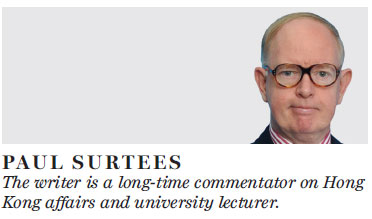SAR's railway operator should do more to improve travel experience
Updated: 2016-05-03 08:06
By Paul Surtees(HK Edition)
|
|||||||||
Given that Hong Kong's much-admired Mass Transit Railway (MTR) will soon be reviewing its Fare Adjustment Mechanism, this could also be an appropriate moment to review its general service quality. Such a review is made all the more pressing by a raft of disparate issues which some passengers are apparently unhappy about. These range from the question of limiting access to travel on MTR trains by those transporting large musical instruments; to differing views about the equity of the fare adjustment process; to attempting to control the use of foul language by some passengers. This commentary explores some other areas where there is yet room for improvement, in terms of both MTR management actions and passenger conduct.
Some areas for improvement fall within operating procedures while others depend on better passenger conduct. Even during the busy rush hours, when there is barely standing room in many carriages, some passengers are allowed to enter the trains bearing bulky suitcases on wheels. Furthermore, their bearers often transport these unwieldy items by escalator, rather than by lift, while talking on their smartphones. This poses a danger of unsecured heavy baggage crashing down on other passengers, and should be stopped by uniformed MTR staff.

There are MTR announcements warning of the dangers of rushing on the escalators, of not holding the handrail, and of being preoccupied with your smartphone. Yet it is a common sight to see passengers doing all three, at the same time! They thereby endanger themselves, and other passengers.
Despite constant platform announcements against this, many passengers continue to block the exit of people attempting to get off at their station by surging in, immediately the carriage doors open. This particular problem can only be solved by more considerate passenger behavior becoming widespread.
A few years back, I noticed that more people could be seen eating and drinking on MTR trains, although that has always been (in theory, at least) prohibited. I raised this issue with the MTR Corporation (MTRC) management of the time, and their initial reaction was to deny that there was much of a problem. So I got their head of public relations to accompany me on an MTR train ride. We observed some passengers eating and drinking in almost every carriage of that particular train. As a result, more little signs advising against eating or drinking were put up inside the train carriages.
These signs are mostly too small and too few to capture the attention of many passenger. And then, as with any law or bylaw, there needs to be some enforcement action if there is to be any hope of it being obeyed. The MTR could certainly do more here.
Most MTR station concourses contain shops selling take-away food and drink items. Admittedly, some of these purchases will be consumed in the passenger's office or home, but clearly many are consumed during the MTR journey itself. It is the MTRC itself which lets out numerous shop premises within their stations to take-away food and drink outlets. Some would view that as tacit encouragement to passengers to bring food and drink items onto the trains. The MTR could require their station shop tenants to provide an eating space, be it only a shelf or counter, or tables, for the consumption of food and drink there, rather than on the trains. These areas could have signs advising purchasers against bringing their take-away items on board the trains, in the interests of hygiene and out of respect to their fellow-passengers.
Larger in-carriage signs banning eating or drinking are needed, coupled with a revised bylaw to impose on-the-spot fines of say HK$100 on each person caught breaking that prohibition. But this will only be effective if the MTR employs on-train inspectors to enforce such new, stricter rules.
There are too few rubbish bins on station platforms, and none at all on most trains. Thus discarded greasy food wrappings and empty coffee cups end up on the seats or floor of the trains. The least the company can do in the present circumstances is to provide more rubbish bins on trains and platforms to collect the messy residue from passengers.
With an aging population, even with clearly marked "special needs" seats, many infirm, disabled or elderly people are left standing on the trains - simply because there are as yet too few such designated seats. Other passengers could ease this problem by being more willing to give up their seat to someone in need. Clearly, more such designated seats are needed, too.
By enforcing their own bylaws and taking the other steps proposed above, hopefully joined with more considerate passenger behavior, the travelling experience on Hong Kong's MTR system could be further enhanced.
(HK Edition 05/03/2016 page8)